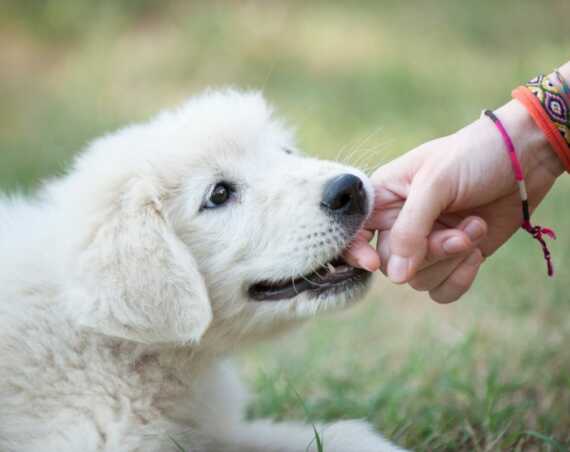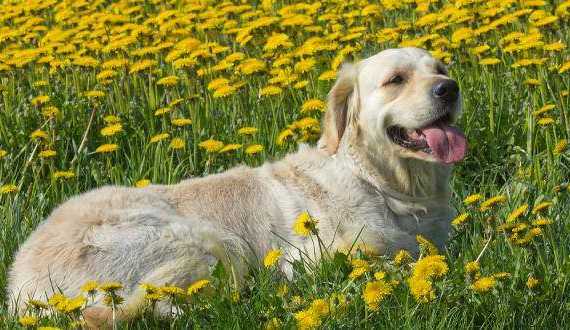Updated: November 11th, 2022
This article contains affiliate links. Read the full disclosure here.
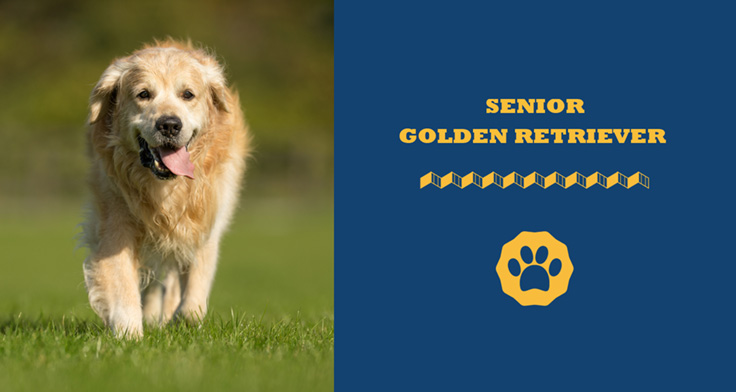
A senior golden retriever may show behavioral and health signs you must pay attention to. Aging goldens may also be slower and sleep more often than younger dogs. It’s important to look out for signs of aging so you’re well prepared when it comes to taking care of your pooch well into their golden years.
In this post, you’ll find out what is considered an old golden retriever and signs your beloved pet is starting to age. I’ve also provided tips on the best ways to take care of your dog and what products to use to support a senior goldie. Read on to find out more.
When Is A Golden Retriever A Senior?
Large dog breeds such as the golden retriever are considered senior at the age of 8 years old. This is when the goldie enters their final years. As puppies, goldens have plenty of energy, and they love playing with their owners.
However, when this dog breed reaches 8 years old, they’ll start slowing down in many ways. They can also become prone to a wide range of health issues commonly experienced by older dogs. Fortunately, most of the signs of aging are easy to identify and prepare for to ensure your dog is as comfortable as possible.
Signs Your Golden Is Getting Old
Your pooch may not start showing signs of aging immediately after entering their geriatric years. In fact, your goldie may still be incredibly active or act like a puppy. But as time goes by, you’ll start noticing signs of old age. Below, I’ll discuss some of the most common signs of an aging goldie and how to spot them.
Changing Coat Color
Similar to humans, an old golden retriever will start going gray particularly around the eyes and muzzle. The golden hue of their coats will also start to lighten and become somewhat dull. This is because the pigment cells responsible for color stop producing as your goldie ages.
A change in coat color is one of the first signs your golden retriever is aging. Sometimes, your golden can start to go gray as early as 5 years old.
Cloudy Eyes
As dogs start to age, their eyes become lighter, and they may appear hazy. Cloudy eyes can be the result of a serious eye condition such as nuclear sclerosis and cataracts. These eye conditions are common in senior golden retrievers.
Weight Gain
It’s not uncommon for old golden retrievers to gain weight. Their metabolism slows down, and it becomes more difficult for their systems to digest food. Another reason why they might become a bit chunky is they’re not running around as often as what they used to.
Slowing Down
Some older golden retrievers will develop conditions such as arthritis and or muscle cramps which makes it difficult for them to move around. Your golden may find it difficult to jump or run, and they’ll start getting tired faster during walks.
Bad Breath
Golden retrievers who’ve reached the age of 11 or 12 may start to develop bad breath due to underlying health conditions such as kidney disease. Bad breath in golden retrievers can also be caused by tooth decay. It’s best to take your pooch to the vet to check what the cause (or causes) of bad breath could be.
Becoming Grumpy And Aggressive
As they age, your once happy, upbeat, eager-to-please golden may become grumpy and have less tolerance for people. Becoming old can be uncomfortable for goldens because of their health issues and stiff joints. They won’t like being around noisey or rowdy people, and they’ll sleep more.
What Is The Average Lifespan Of A Golden Retriever?
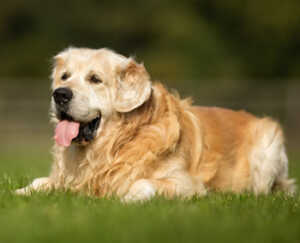
The average life expectancy of a golden retriever is between 10 and 12 years old. However, there have been instances where goldies have lived to 19 years old. The oldest golden retriever, named Augie, lived to the ripe age of 20 years old!
Augie was a female golden retriever born in April 2000. Her life was not an easy one because she was rehomed twice. When Augie found her forever home, she had already surpassed her life expectancy. She was 14 years old. Sadly, a few months before her 21st birthday, Augie passed away.
So, golden retrievers can live for more than 11 years, but this will depend on their genetics, health, and how you feed them. Goldies must get plenty of exercise and a proper diet specific to their breed.
Do Senior Goldens Have Special Needs?
Golden retrievers require special care throughout their lifetime and not only when they become seniors. Additionally, senior goldens shouldn’t be overwhelmed or overstimulated with physical activity. Strenuous exercise can contribute to their muscle aches and stiff joints.
Furthermore, you may need to modify your home to accommodate your old golden. For example, if you have stairs, you may need to prevent your dog from climbing them by installing a gate at the bottom. You should also consider taking out pet insurance to help cover medical costs for your aging goldie.
How To Care For A Senior Golden
Senior golden retrievers require special supplements, food and exercise to keep them healthy and prevent illnesses. In this section, I’ve provided valuable information on how to take care of your aging golden.
Nutrition
One of the most important parts of caring for a dog–especially a senior golden retriever–is a proper diet. You’ll need to ensure your dog gets all the vitamins, minerals, and other nutrients they need to extend their lifespan as much as possible.
Protein
As mentioned above, as your golden retriever ages, you may need to adjust their diet. The ideal diet for an aging golden is high-quality protein-rich food that consists of at least 30% protein to keep your pet healthy. Additionally, protein helps build and repair body tissue and muscles and promotes a healthy skin and coat. You can get quality protein from various commercial pellet kibble foods or feed your golden:
- Lamb
- Fish
- Beef
- Chicken
- Turkey
Carbohydrates
Your golden’s food should contain 30% to 35% carbohydrates to support cognitive function and energy. If your senior golden retriever is still incredibly active, you’ll need a higher carbohydrate content. For goldens that aren’t as active and sleep often, they’ll need food with less carbohydrates.
Vitamins And Minerals
Aging golden retrievers need a diet that consists of vitamins and minerals to support gut, muscle, and cognitive health. Your golden’s food should contain high levels of the following vitamins:
- Vitamin A
- Vitamin B
- Vitamin C
- Vitamin D
- Vitamin E
- Vitamin K
Foods such as pumpkin, spinach, carrots, and eggs are rich in vitamins, so you can either feed your golden a raw diet or buy foods such as Royal Canin.
Additionally, your aging golden needs a healthy dose of minerals such as:
- Magnesium
- Potassium
- Zinc
- Iron
- Sodium
These specific minerals maintain fluid balance and transport oxygen throughout the bloodstream. You may want to buy commercial pet foods that are rich in minerals and contain organ and muscle meats. Hill’s Science Diet has a rich source of minerals to support healthy digestion.
Fats
Oils are essential for aging golden retrievers, and your dog’s food should contain between 12% to 18% fat. Find foods that contain fish oils from cod liver or salmon. Fat is a prime energy source and can provide omegas to your golden’s diet to reduce shedding and promote healthy joints and muscles.
Supplements And Medication
If your golden retriever’s commercial food isn’t providing enough nutrients or the type of vitamins and minerals the vet has prescribed, you can administer supplements. Healthy Breeds makes multivitamin soft chews that contain all the vitamins and minerals a senior golden needs. These chews also contain antioxidants to reduce inflammation.
Aging golden retrievers may also need specific medication prescribed by your vet. You can also administer natural medication such as CBD oil or chews. There are CBD or hemp supplements such as Charlie and Buddy for pain and stress relief.
Grooming
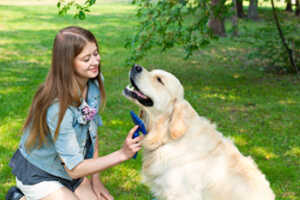
Senior golden retrievers may not run around as often as they used to. Running around and exercising helps to naturally file your golden’s nails. But underactive senior goldens will have problems with overgrown nails. You can either take your golden to get their nails trimmed by a professional groomer or you can trim them yourself. Ensure you use a pet-friendly nail clipper.
Before bathing your golden retriever, you must first understand your dog’s coat and skin. Some goldens may have an allergic reaction to some shampoos. Use a pet-friendly shampoo, and ensure it doesn’t affect your dog’s skin.
Grooming should be done every four to six weeks to keep your dog’s coat clean and under control. Furthermore, regular brushing helps keep shedding under control.
Oral Care
Golden retrievers generally don’t suffer from any dental problems. However, it’s still important to keep your senior golden’s teeth in good condition by brushing them or providing food that cleans their teeth naturally.
Plaque buildup can cause gingivitis and tooth decay. Your aging golden may suffer with toothaches and sore gums if you don’t take care of their oral health. You can take your golden to get regular teeth cleanings done at a groomer, or you can simply brush their teeth yourself with a soft toothbrush.
Vet Visits
Regular vet visits are a must for senior golden retrievers to ensure you can catch any health problems early and treat them accordingly. Your vet will also give you advice on what food, supplements, and medication your golden needs.
Canines don’t always show signs of being ill or in pain, but you can detect changes in behavior. If you notice any changes in your dog’s regular habits, you should take your pooch to the vet. Your vet will also let you know when to come in for visits so you know when it’s time for your golden to go for a check-up.
Exercise
Exercise will depend on your senior golden’s energy levels and health conditions. Vigorous exercises can worsen certain conditions such as arthritis or muscle pain. If this is the case, your pooch will need low-intensity exercises such as stretching, or you can allow them to float around with you in a swimming pool.
But for healthy, active senior goldens, a good 20 to 30 minute walk a day will help keep their energy levels up. You can also give them mental stimulation such as playing ‘find it’ games with them or buying them puzzle toys.
Sleeping Arrangements
It’s important to provide your senior golden retriever with proper sleeping arrangements. If it’s cold, allow your golden to sleep in the living room or your bedroom where it’s warmer. In summer, your pooch can sleep in the kitchen or in an area where it’s tiled to prevent them from overheating.
Ensure your pet has a soft, comfortable bed to sleep on with blankets to keep them warm. Keep your golden’s bed and linens clean, especially if they suffer from skin allergies.
FAQs About Senior Golden Retrievers
What is the most common cause of death for a golden retriever?
The most common cause of death for golden retrievers is cancer. Studies show that golden retrievers are more prone to developing neoplasia compared to other dog breeds.
Can a golden retriever live past the age of 12?
Yes, golden retrievers can live longer than their average life expectancy of 12 years. Some golden retrievers have lived between 14 and 20 years of age. How long your golden lives will depend on many factors, such as their health, diet, and environment.
How much should a senior golden retriever eat?
Golden retrievers are big dogs so they require more food than smaller breeds. But as these dogs age, they may need to cut down on their food intake. It’s recommended that you feed your golden between three to five cups of dry kibble pellets a day.
Do female golden retrievers live longer than males?
No, the life expectancy of male and female golden retrievers are the same. In some cases, both male and female goldens can live for up to 15 years, which is 3 years past their life expectancy.
Final Thoughts
As your golden retriever starts to age, you should do everything you can to make sure your pooch is comfortable. Something as simple as making their beds more comfortable can help ease their pain or make them happy. You can also try CBD supplements for aging golden retrievers to assist with pain relief and stiff muscles.
Ultimately, your golden retriever’s age will depend on a number of factors, including but not necessarily limited to:
- Genetics
- Health (and any health conditions they may have)
- Diet
- Exercise level
- Environment
- The level of care/treatment they receive from you and their vet
Lastly, it’s important to give your aging golden plenty of love and attention. Keep an eye out for any changes in their behavior. I also recommend visiting your vet if your golden suffers from any chronic healthy conditions. Use the tips in this article to ensure you provide the best care in your golden’s last years with your family.
If you have any comments or firsthand experiences with senior golden retrievers, please post them below or share your pictures via our social media.


